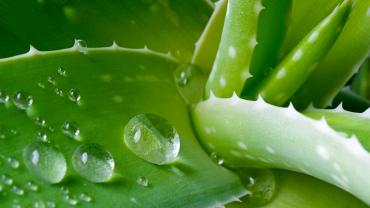
Changes in skin elasticity are often associated with the aging process. Certain botanicals, such as aloe vera and bamboo, have been shown in recent research to support skin health and the aging process.
Aloe vera contains over 75 bioactive compounds, including vitamins A, C, E, and B12, zinc, copper, selenium, calcium, anthraquinones, lignin, saponins, and enzymes, such as amylase, catalase, and peroxidase. Aloe vera and its constituents (aloesin, aloin, and emodin) have been shown in studies to help support skin health. In laboratory studies, aloe vera upregulated transforming growth factor beta-1, basic fibroblast growth factor, and vascular endothelial growth factor-A expression in fibroblasts. Aloe vera also helped increase keratinocyte proliferation and differentiation. Aloin has been shown to increase glutathione and superoxide dismutase activity, reduce the production of interleukin (IL)-8 and reactive oxygen species (ROS), and attenuate DNA damage and lipid peroxidation.
Clinical trials indicate that oral administration of aloe vera may promote facial skin integrity by stimulating hyaluronic acid and collagen production. A randomized, double-blind controlled trial studied the effects of low-dose aloe vera sterol supplementation on skin hydration and integrity in adult Japanese women. This 12-week study showed improvements in objective wrinkles, dryness scales, and significant improvements in objective face erythema and pruritus. It also showed significant increases in skin barrier function, skin moisture, and collagen content in the dermis.
Bamboo (Bambusa vulgaris) is understood to be an accumulator of silicon. Silicon is present in all healthy tissues in the body, including the skin, hair, and nails. Its presence decreases over the course of a lifetime, which is believed to be due to the atrophy of the thymus, as the thymus is responsible for silicon absorption. Silicon has been shown to play a role in the stimulation of collagen type 1 synthesis in skin fibroblasts. When bound to glycosaminoglycan in the extracellular matrix, silicon may stimulate crosslinking and synthesis of proteins, such as elastin, potentially contributing to the integrity and flexibility of the connective tissues of hair, skin, and nails.
Recent studies indicate that senescent cells may play a role in age-related skin changes. A recent review article explored the connection between cellular senescence, skin aging, and the health-supportive role of polyphenols. A randomized, double-blind placebo-controlled study assessed the efficacy of the daily ingestion of cocoa (a comestible high in polyphenols) for 25 weeks on skin integrity in women. Improvements in skin elasticity were observed after week 12, and the study also observed improvements in wrinkles.
The senolytic effects of extracts from Alpen rose (Rhododendron ferrugineum) were studied in a placebo-controlled trial involving women between the ages of 40 and 65 years. Participants applied a cream with 2% Alpen rose extract on the face and neck for 28 days. Significant improvements in skin elasticity and redness were observed at the end of the study.
Although further research is still needed, certain botanicals may support health aging and skin integrity. These botanicals include aloe vera, Alpen rose, and bamboo.
By Colleen Ambrose, ND, MAT